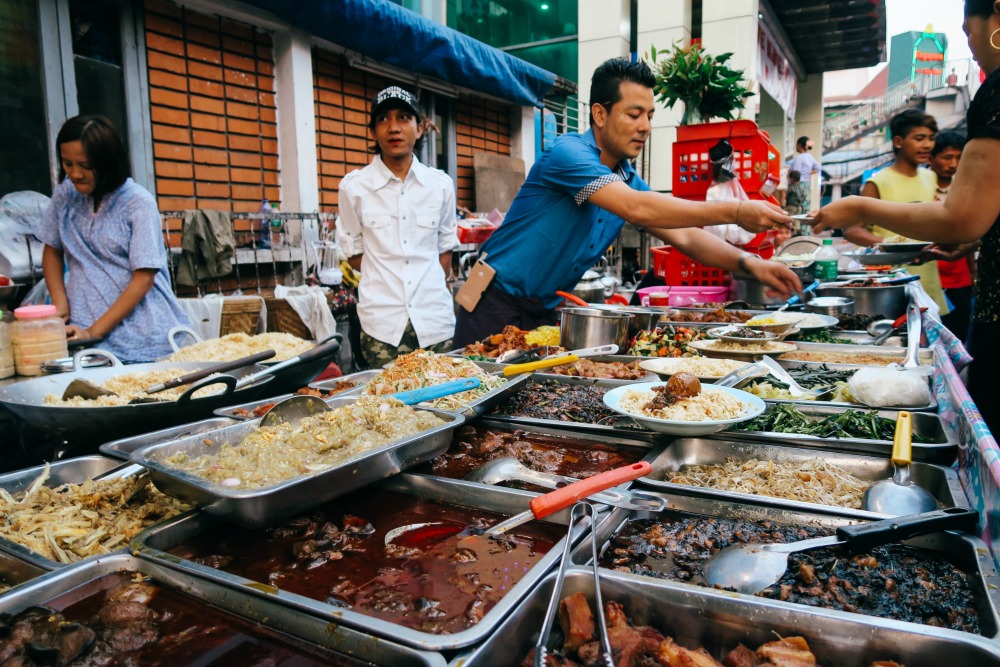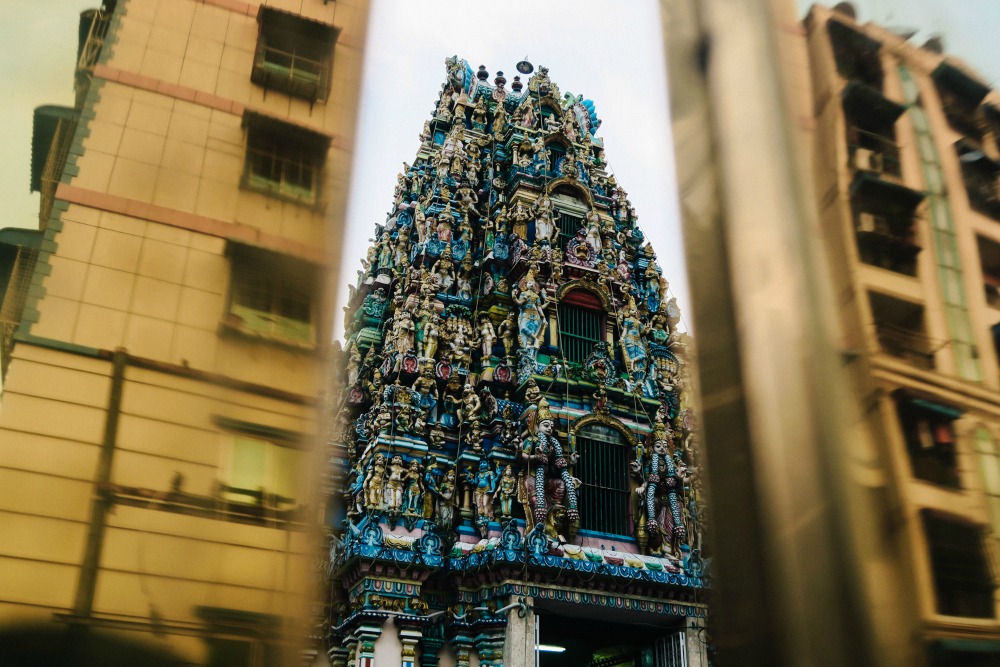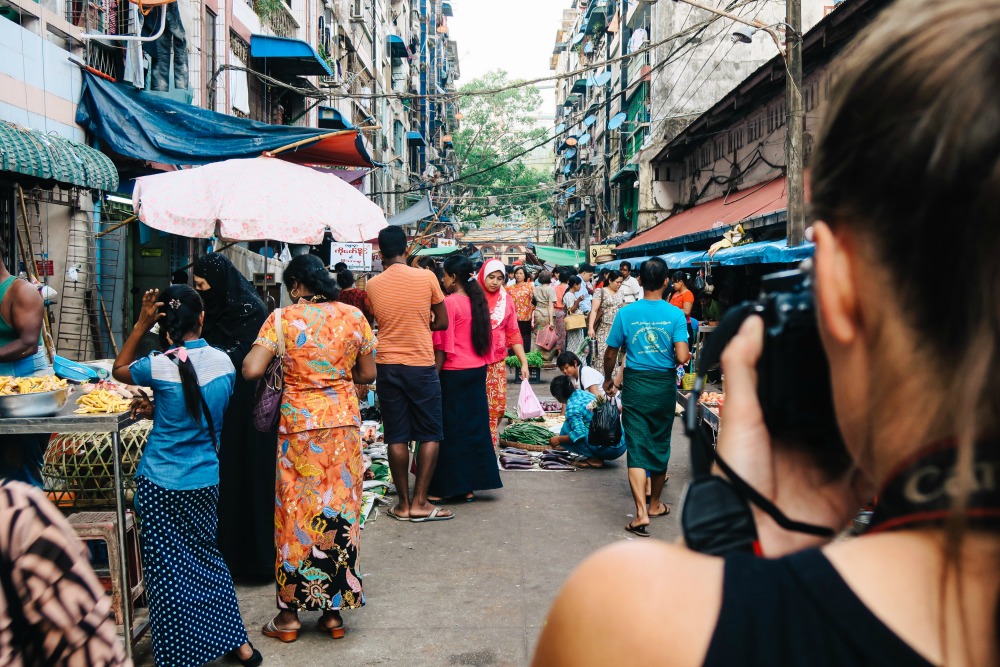
As night falls over Yangon, the pace of the urban sprawl that’s home to 5.21 million intensifies. Stalls spring to life, the smell of food wafts down alleyways, and people finish work and spill out onto the streets. There are after-hours errands to run, meals to be shared between family and friends, and jovial conversations to be had across market stalls and streets. The city is alive.
When we first arrived here, we knew we definitely wanted to sample some of this vibrant nightlife, but weren’t sure where to look for a more authentic local experience. We’d also been put off by some… ‘unpleasant’ ramifications of eating street food during our Southeast Asian travels, and were keen to know where we could enjoy some tasty local fare without paying the price later.
Enter Urban Adventures, and our wonderful guide and new friend, Thura (he was also our guide for the ‘Let Yangon Take You For a Ride’ tour, which really was the Best. Day. Ever.), and you have a tour of ‘Yangon’s Streets By Night’ with a local twist. Promises of meandering local alleyways, zen-stops at temples, and a chance to see where the locals really eat? Sign us up.
It takes about five minutes before we come across a busy street corner overflowing with food trays. As we sidestep the many people following their noses to all this food, Thura explains that, particularly for city workers, it’s cheaper and more convenient to eat here each night. The stalls open at sunset and it doesn’t take long before they’re jammed with people grabbing some nightly sustenance. Plus, he says, Burmese people also enjoy sharing mealtimes, so these places are very social spots. All the proof we need is in the bursting communal tables spilling onto the street — full of happy, laughing locals sharing curries, rice, noodles, and seasonal broth.
We make another stop at a bookstore where we discover that the owner studied political science at Yangon University in the late ’50s — when Yangon was still a thriving Southeast Asian hub, the university was considered among the best in the region. The walls are lined with books about Aung San Suu Kyi, and a pile of the daily print newspaper, Democracy Today, ‘serving the peoples’ right to know’ sits neatly in the doorway. He smiles with pride as he points to them. “Times have changed now. Not so long ago, it was dangerous to display these. Now we can talk about the lady [Aung San Suu Kyi] again freely.” Myanmar is on the move.

Making our way through the streets, we’re given a fascinating insight into the diversity of the city’s inhabitants, its produce, and its traditions. A papaya salad stall here, a samosa stand there, fried rice and tandoori chicken, sugar cane presses. We seem to be in the centre of a complete melting pot of cultures that happily exist alongside each other.
Nowhere is this more evident than during the stops we make at various temples in the city. The Sri Kali Hindu Temple is colourful, covered with hundreds of Hindu gods, marigold garlands woven out the front for devotee offerings. A stop we make at a Chinese temple is most memorable for its clouds of incense, which crept into our nose, mouth, and eyes. Both sites had a sense of mystical serenity far removed from the energy and noise of the markets outside, and gave us a broader understanding of Myanmar’s ethnic diversity and complex religions.

What’s striking about Yangon at night is that there are thriving markets down every side street and on the edge of Anawrahta Road. Everywhere we look, vendors hustle produce while potential customers jostle each other out of the way, keen to get the good stuff before someone else does. Every now and then, we catch the eye of a local who breaks into a huge grin, surprised to see a group of foreigners walking through the space.
Then, there are the smells. Some so sweet and delicious that we almost stray from the group trying to find the source, others so potent (fish paste, we’re looking at you!) that it’s all we can do to hold our breath and hope we make it out alive. Between that, the colours, and the occasional elbow from someone hurrying past, it’s a sensory overload of the best kind.

Anawrahta Road is Yangon’s busiest and most central market, where the lighting is dim but the produce is fresh. The market spills out onto the road behind, traffic whizzing by as throngs of people wander up and down the stalls. Thura proves his mettle as a focused and observant guide, successfully leading us all past the rows of delicious fried foods, bright wares, and exotic sweets that beckon us away from the group. He stops long enough to satisfy our curiosity; to observe a technique or sample a small mouthful of coconut jelly, then we’re off again. After all, locals know there’s always something better around the next corner!
He’s not wrong. Around the next corner we find ourselves at a long table, barbecue sizzling nearby. “Dinner time, YEAH!” calls Thura, pulling out chairs for us all to sit. While we eagerly await the arrival of our (delicious!) barbecued meal, he tasks himself with ensuring we’re adequately stocked with beer. Myanmar, of course. A Buddhist, he doesn’t drink himself but under his watchful eye and genuine hospitality our cups continue to runneth over.

During dinner, we lean over and ask him what he likes best about his country. “Probably the people — we take pride in having warmth. See, Buddhism teaches you to have generosity, respect, be good to your family. Every Burmese person communicates in this local language of friendliness first.” He suddenly jumps up excitedly, a pack of cards appearing from his pocket and he entertains us for the next half hour with some of the most impressive card tricks we’ve ever seen, drawing some spectators in from the street too.
Sitting down to a round of applause, he slides the pack across the table to us and whispers, “I heard you talking earlier about how you like playing cards but don’t have a pack. Here’s a little gift to you, so you can always remember your time in Yangon with your friends here.”
On the awesome scale, Thura took our evening to the next level. Locals know the best experience is an authentic one.